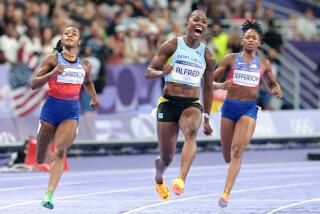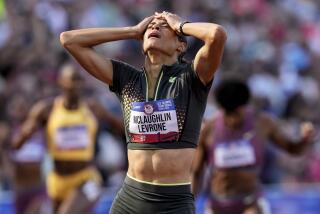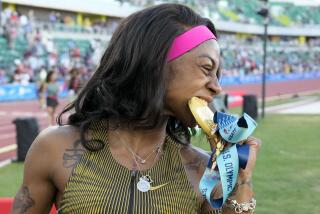Richards is seeing double
- Share via
When you can run a lap around the track as fast as Sanya Richards does, it is hard to wait for anything.
So Richards, winner of 18 straight 400-meter races since August 2005, must fight her own desire to go where she knows her career can take her before she is ready to get there.
That is when Richards must listen to the advice of her wise, veteran coach, Clyde Hart, who reminds her that neither a season nor a career is a sprint.
Latest example? Richards, the world and U.S. women’s athlete of the year in 2006, wants to get a running start on her plans for a 200 and 400 double at the 2008 Olympics. So she has entered both events at the U.S. Track and Field Championships that begin Thursday in Indianapolis, giving her a chance to qualify for both at August’s World Championships in Japan.
There are several complications in her plan, which is why Hart once again will be counseling patience to the 22-year-old Richards, whom he has coached for three years.
The first problem is the world championships’ schedule, with the first two rounds of the 200 on the day capped by the 400 final. Even if one 200 round is eliminated, as seems likely, Hart will discourage Richards from trying the double.
“I don’t think it is wise at that type of competition to jeopardize one event to try to run two,” Hart said this week. “I’m not in favor of doing anything prior to the final of the 400. But a lot will depend on how her training is going.”
There’s the second problem. Richards is behind schedule because of a lingering illness -- Behcet’s Syndrome.
It is an inflammation of the blood vessels that left her with bronchitis-like symptoms and sores in the mouth that Richards said made it occasionally too painful to talk.
Then, after deferring her season debut once, she had to put it off again last month because of pain in her knee.
Richards finally ran June 10 at the Prefontaine Classic in Oregon and followed that five days later at the Golden League meet in Oslo, where she clocked 50.26.
That time is pedestrian by her 2006 standards -- Richards ran faster in 11 of 13 races last year -- but is third best in the world this season, behind the 50.13 and 50.23 by NCAA champion Natasha Hastings.
So a third straight national title in the 400 is not the foregone conclusion it seemed after Richards broke 50 seconds nine times last year, topped by a 48.70 that broke Valerie Brisco-Hooks’ 22-year-old U.S. record.
“It’s going to be extremely hard,” Hart said. “It’s only her third race of the year, and her competition has had a lot of races and may be better prepared for running rounds.
“She just has to get through it and make the top three [to get a worlds’ spot in the event]. Then we can think about the 200.”
The last time Richards lost a 400, finishing second in the final of the 2005 world meet, it became another object lesson in not racing to conclusions.
“It was a humbling experience,” Richards said. “I felt I had already mastered the strategy Coach Hart was teaching me. I was a bit overconfident.
“When I lost that race, I realized I still had weaknesses. That was a turning point in my career.”
The Waco, Texas-based Hart, who also coaches 400-meter world and Olympic champion Jeremy Wariner, agreed with her assessment of its impact.
“She knew after that race she wasn’t going to lose again,” Hart said. “That propelled her.”
Richards won her final four races last season by a second or more, against fields with the rest of the world’s best. That propelled her to consider the possibility of breaking the world record, 47.60, by East Germany’s Marita Koch in 1985.
Hart discounts not only Richards’ chances but also the record itself because it came from the era when rampant doping and see-no-evil officials led to world records in 12 women’s events that have stood since 1988 or earlier.
“Everyone in track and field knows if there is one record that is tainted, it’s the record in the women’s 400,” Hart said.
Only four of the fastest 25 quarter-miles -- and none of the top five -- have been run since 1988. Richards’ best is 16th on that list.
“If that’s the world record, that’s the world record I’m going for,” Richards said. “I have been studying tapes and watching how Marita Koch ran that world record, and it’s something I think I can definitely attain in a couple years.”
Some things take time, no matter how fast you are.
--
Philip Hersh covers Olympic sports for the Times and the Chicago Tribune.
More to Read
Go beyond the scoreboard
Get the latest on L.A.'s teams in the daily Sports Report newsletter.
You may occasionally receive promotional content from the Los Angeles Times.






